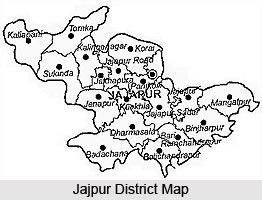 Jajpur District is popularly known as Biraja Khetra, which translates as `the place sacred to Goddess biraja`, and is located on the banks of the Baitarani River. The district is historically very important and is known from the excavated facts that it was the capital of Orissa during the Kesari Dynasty. Following the investigations of the historians Jajpur is the home of Lord Jagannath and also existed as the section of Kalinga, which intensifies the historical significance of the place.
Jajpur District is popularly known as Biraja Khetra, which translates as `the place sacred to Goddess biraja`, and is located on the banks of the Baitarani River. The district is historically very important and is known from the excavated facts that it was the capital of Orissa during the Kesari Dynasty. Following the investigations of the historians Jajpur is the home of Lord Jagannath and also existed as the section of Kalinga, which intensifies the historical significance of the place.
Location of Jajpur District
Jajpur District is located in between 20 degree 30 minutes to 21 degree 10 minutes north latitude and 85 degree 40 minutes to 86 degree 44 minutes east longitude covering an area of 2887.69 sq kms. Northern boundary of Jajpur District is bounded by river Baitarini and by the districts Keonjhar and Bhadrak, in the south by Cuttack District and in the east by Dhenkanal District and in the west by Kendrapara district.
History of Jajpur District
The historical significance of Jajpur district is evident from the nomenclature of the district, which is believed to be named after the Somvanshi King `Jajati Keshari`, in early 10th century. The history of Jajpur from time immemorial is synonymous with the Viraja or Viraja Khetra. History of Jajpur states that as a seat of ancient culture and a holy shrine for Hindus, this district was once studded with scores of ancient stone temples as in the temple town of Bhubaneshwar. A new political situation developed in the district with the rise of the Bhaumakaras in 736 AD. The two powerful dynasties, Bhaumas and Somvanshi reigned over the whole land mass of modern Orissa for almost four centuries and saw the formative period of life and culture of the people. This period was indeed a remarkable epoch. Somvanshi King Jajati Keshari made Jajpur his capital. History of Jajpur District says that Jajpur was not only the capital of two important dynasties but also has contributed a lot to the synthesis of different regions which flourished in Orissa over the years.
Tourism in Jajpur District is developed around the archaeological museum of Ratnagiri, which is one of the important site museums of archaeological Survey of India.






